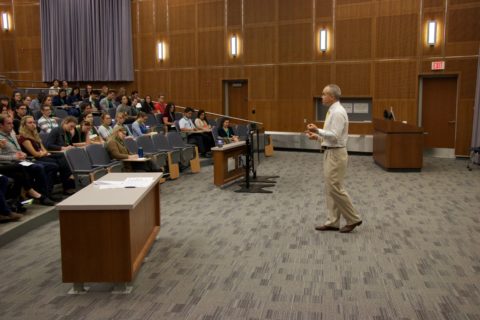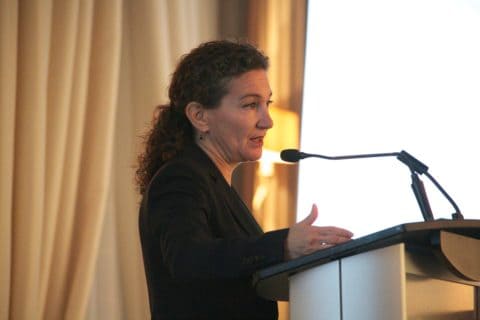From Aug. 26-28, about 150 students and faculty participated in the University of Saskatchewan’s fifth annual One Health Leadership Experience, a conference that builds bridges between different colleges on campus and takes the first steps to achieve success in solving health problems through collaboration, communication and inclusion.
One Health is a global initiative that aims to attain optimal health for people, animals and the environment, working locally, nationally and globally. This year, OHLE 2016 featured seven speakers who represented a variety of organizations, including the World Health Organization, United States Centers for Disease Control and Prevention, the Minnesota Department of Health and Zoetis.
Allene Praxedes, a fourth-year nursing student who has been attending the conference for four years, shares her passion about One Health.
“I believe a lot of the issues that the world faces can be solved if the current [systems] can be broken down and if more people understand that everything is

L. David Dubé, a member of the U of S Board of Governors and CEO of the Saskatoon-based Concorde Group, gave his perspective on leadership to participants at the One Health Leadership Experience.
connected and have a ripple effect with each other,” Praxedes said, in an email to the Sheaf.
She also adds the reason for her consistent attendance in the conference.
“I keep coming back to the conference to hear from the different speakers each year, to meet other professionals from different disciplines and to increase interest as well as knowledge about One Health,” Praxedes said.
Dr. Douglas Freeman, dean of the Western College of Veterinary Medicine and advocate of One Health, led the creation of the first OHLE at the U of S in 2012.
According to Myrna MacDonald, communications and media of WCVM, more than 700 students have attended the event since OHLE was created.
William Hueston, a speaker representing the Center for Animal Health and Food Safety at the University of Minnesota, stated that One Health is about working together to achieve the greatest levels of progress with the least resources, least cost and in the least amount of time. He believes that everyone has expertise that they can contribute and that the key to progress is engaging as many stakeholders with different perspectives as possible.
“If we can help folks to focus on all that we agree upon rather than on our differences, we can find opportunities to work together toward common objectives. This is really a key One Health leadership practice,” Hueston said, in an email to the Sheaf.
While the conference provided networking opportunities, it also offered a variety of informational sessions. Donna Jenkins, founder of Zachary’s Paws for Healing, explained that the organization — the only of its kind in Canada — facilitates dog and cat visits with their owners while in hospital and fosters pets for patients as long as needed at no charge. ZPFH also works closely with the Regional Rehabilitation Center at Hamilton General Hospital, Ont., and provides therapy dogs for weekly visits with patients.
Jenkins shares why pets have a great impact on hospital patients.
“The pets bring a sense of normalcy to the patient. The pet shows unconditional love for their human. Pet visits can stabilize vital signs, improve mental outlook when patients are feeling isolated, depressed and withdrawn. The pets offer touch, warmth and companionship when the patient has a real need. The pet visit can

Dr. Elizabeth Mumford of the World Health Organization was one of the six keynote speakers at the 2016 One Health Leadership Experience.
remind the patient there is a reason to get well and go home,” Jenkins said, in an email to the Sheaf.
Jenkins adds that ZPFH is always in need of volunteers and hopes that by 2020, there will be programs like ZPFH across Canada, an effort that can be achieved through donations.
In contrast, David Fisman, a speaker from the Dalla Lanna School of Public Health, University of Toronto, discussed the role of One Health collaboration in understanding infectious diseases in humans and animals.
“Most novel infectious diseases emerge where there are changes in the type or nature of interactions between humans, animals and the environment. I frequently learn from animal health and ecologist colleagues; the knowledge I get from collaborating with them helps me better understand human disease risk,” Fisman said, in an email to the Sheaf.
Other speakers at OHLE 2016 included Elizabeth Mumford, Stacy Holzbauer, L. David Dubé and Nicole DeFraeye who all spoke about One Health and leadership.
Although the conference featured working professionals, it also made an impact on many students in attendance. Chelcy Laude, second-year arts and science student, shares her first experience attending OHLE 2016.
“The conference was so much fun. I got to learn a lot of stuff, from socializing up to health matters in a global perspective. One thing that got my mind wrapped up was a quote from Dr. William Hueston: ‘All of us are leaders. We just have to act upon leadership to make it shine,’” Laude said.
Janel Broqueza, first-year arts and science student, believes that the conference is perfect for people who are interested in making a change.
“I would definitely recommend the One Health conference to anyone who’s interested because it gives you the opportunity to collaborate with other people outside of your department, and the conference is really eye-opening and insightful and, plus, the food’s great!”
—
Jaline Broqueza
Photo: Jeanette Neufeld / Supplied
Photo: Myrna MacDonald / Supplied